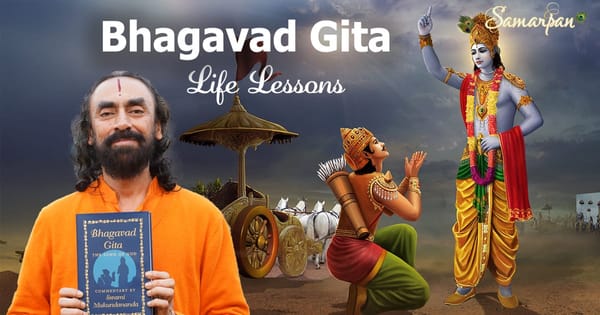
From the Editor’s Desk
The month of January is the time for new beginnings and an opportunity to make resolutions for a truly fulfilling life. Taking inspiration from the eternal Jagadguru Shree Krishna and the Jagadguruttam of this yug, Shree Kripalu ji Maharaj, we attempt to understand how hypocrisy can be an obstacle to spiritual growth. We are equally fortunate to be blessed with the opportunity to learn the practical application of this tatvagyan from our Guru, Shree Swami Mukundananda ji, who teaches us about being simple in a hypocritical world. Additionally, He teaches us about the characters in history who attained God by being simple-minded, and how simple-mindedness is the path that leads to God.

Vedic Wisdom & Application
Challenge of the Month
Being Simple in a Hypocritical World
Reflection Questions
- What is Hypocrisy?
- Why do the Vedic Scriptures Emphasize Simplicity Over Hypocrisy?
- How Can We be Simple in a Hypocritical World?
In this day and age of Kali, hypocrisy seems to be ingrained in our hearts. It is virtually impossible to be simple-minded and straightforward. Let us learn about the true meaning of hypocrisy from a material and spiritual perspective, and the value of being simple in a hypocritical world.
What is Hypocrisy?
Psychologists define hypocrisy as the habit where there is a lack of correspondence between one’s words and actions. In other words, hypocrites claim to possess ethical standards and expect others to adhere to them, however, they themselves do not practice the same standards. For example, propagating equality as a constitutional right of all human beings, yet treating people from underprivileged groups with disdain.
Similarly, philosophers have suggested that hypocrisy is rooted in an intent to deceive others vis-à-vis the seemingly righteous beliefs, however, the actions do not align with the beliefs. There are real-life examples in modern history including evangelists, politicians, and athletic coaches who prophesized one code of behavior for the masses but shamefully practiced the opposite. Such behavior reflects a false sense of righteousness, indicating a misalignment between one’s beliefs, words, and actions. Even those who are seemingly attracted by the lure of an ascetic life to escape from the miseries of life, superficially renounce the external world without the corresponding attachment to the divine realm. As Shree Krishna explained to Arjun:

कर्मेन्द्रियाणि संयम्य य आस्ते मनसा स्मरन् |
इन्द्रियार्थान्विमूढात्मा मिथ्याचार: स उच्यते || 6||
karmendriyani sanyamya ya aste manasa smaran
indriyarthan vimudhatma mithyacharah sa uchyate
Those who restrain the external organs of action, while continuing to dwell on sense objects in the mind, certainly delude themselves and are to be called hypocrites (BG 3.6).
Thus, it is better for people to not renounce the world prematurely otherwise they would be caught in a world of hypocrisy where externally they live like ascetics, but internally they crave worldly pleasures.
Not all actions that demonstrate a misalignment with words are hypocritical. For example, if a spiritual seeker expresses a distaste for parties but attends one or more, it is likely that attendance is to meet social obligations rather than enjoyment. This example illustrates that in addition to word-action misalignment, what is equally critical is the evaluative standard that people use to qualify others’ actions as hypocritical.
From this perspective, hypocrisy is when people judge themselves based on their intentions while judging others based on their actions. Described as “dambhi” in the Vedic scriptures, hypocrites feel justified if their actions do not match the standard they established. For example, instituting a corporate policy to not accept gifts from lobbyists, but accepting a vacation package with the justification that it took a lot of effort to secure a profitable deal for the company. From a spiritual perspective, such people have very impure hearts.
In the 7 Divine Laws to Awaken Your Best Self, Swamiji describes four defects in the material knowledge generated by human beings, one of which is vipralipsa or the propensity to cheat. People who are motivated by the desire to hide one’s faults and portray non-existent virtues are also hypocrites because they intend to cheat others to appear good. Shree Krishna told Arjun that such people have a deluded intellect. Filled with false pride, they are drawn to fleeting pleasures of sense objects.
काममाश्रित्य दुष्पूरं दम्भमानमदान्विता: |
मोहाद्गृहीत्वासद्ग्राहान्प्रवर्तन्तेऽशुचिव्रता: || 10||
kamam ashritya dushpuram dambha-mana-madanvitah
mohad grihitvasad-grahan pravartante ’shuchi-vratah
Harboring insatiable lust, full of hypocrisy, pride and arrogance, the demoniac cling to their false tenets. Thus illusioned, they are attracted to the impermanent and work with impure resolve (BG 16.10).
Thus, the key point here is to not go against the injunctions of the scriptures by engaging in contradictory behavior. Additionally, the code of ethics suggests that our beliefs should be based on true knowledge to guide our actions. Such beliefs should not vary based on situations for personal gain.
Chapter 13 of the Bhagavad Gita (verses 8 to 12) describes a hypocrite as one who develops an artificial external personality, with a facade of virtuosity on the outside while being defective from inside. The external display of virtues is skin-deep and hollow.

Such a form of hypocrisy is described in Vedic scriptures as Anrit Bhav, i.e., saying one thing externally but intending something entirely different internally. A perfect example of hypocrisy as described in Ramayana was shown by Sugriv. His heart was filled with selfish desires and he befriended Lord Ram for his own benefit. Such behavior is rooted in conceit and people pretend to be nice on the surface but the inner agenda is to achieve power and recognition.
A variation of Anrit Bhav is Maya Bhav or the desire for prestige. People trapped in maya bhav are more concerned about being called great than becoming great. Spiritual aspirants in anrit bhav, relish their preliminary learning and become inflated with pride when people praise their knowledge or devotion. Swamiji beautifully explains that such people may vocally shed tears during kirtans or devotional lectures but make no effort to decrease their mental afflictions. Their goal is to get attention from others rather than to increase devotional sentiments.
Chapter 13 of the Bhagavad Gita (BG 8 to 12) also explains the concept of simplicity – the opposite of hypocrisy. “Simplicity is straightforwardness in thought, speech, and action. Straightforwardness in thought includes an absence of deceit, envy, crookedness, etc., whereas in speech, it refers to an absence of taunt, censure, gossip, ornamentation, etc. Straightforwardness in action includes plainness in living, forthrightness in behavior, etc.” Swamiji has beautifully explained in his commentary on Chapter 16 (verses 1-3), “Simplicity in speech and conduct unclutters the mind and engenders the sprouting of noble thoughts. The English phrase “simple living, high thinking” aptly expresses the benefits of the virtue of straightforwardness” (BG 6.1-3).
These knowledge-based explanations from the Scriptures help us to understand the importance of discarding hypocrisy to forge ahead on the path of spirituality. At the core, simplicity and straightforwardness require integrity and consistency in alignment between words and actions. These traits are difficult to implement at an individual and institutional level. Yet, for spiritual aspirants, it is extremely essential to get rid of hypocrisy for the welfare of the self and others.
Why do the Vedic Scriptures Emphasize Simplicity Over Hypocrisy?
Hypocrisy is a major obstacle in surrendering to God/Guru whereas simplicity and straightforwardness pave the way for divine grace. This is the reason that Vedic scriptures emphasize simplicity over hypocrisy. God loves devotees who are simple-minded and have a loving heart with no pretense or hypocrisy. Additionally, simplicity frees the mind from the burden of living a pretentious life, enabling it to focus on devotion and love and God/Guru.
A beautiful example of Vibhishan from the Ramayan illustrates this point. Vibhishan’s thoughts, words, and actions are exemplary in simplicity and humbleness. When he was kicked out of Lanka by his older brother Ravan, Vibhishan went to seek Lord Ram’s shelter. His attitude portrayed humility, straightforwardness, and a total absence of hypocrisy. When he approached Lord Ram and Lakshman, his first reaction upon seeing their divine form was so intense, he went into a state of bhav-samadhi (i.e., devotional ecstasy). His body started trembling, tears rolled down his eyes, the hair on his body stood on end, and he lovingly looked at the Lord for a very long time.
When Vibhishan finally came around, he introduced himself as the brother of the demon king Ravan who had kidnapped Mother Sita, and to kill whom, the Lord had appeared. He described himself as a fallen soul with no qualifications to be in the Lord’s presence. He said that he had taken birth in a dynasty of demons, whereas the Lord was a protector of the celestial gods. He compared himself with an owl that loves darkness (i.e., ignorance) and stated that he had a tamasic body with which he had committed sins all his life. Then, Lord Ram asked Vibhishan why he had come to Him if he was filled with such sinful qualities. Vibhishan humbly replied that he had heard of the Lord’s glories from Hanuman ji, one of which was that the Lord was sharnagat-vatsal, or the one who accepted surrendered souls at His lotus-feet. He added that it was the Lord’s choice to accept or reject him. Noting Vibhishan’s genuine sincerity, Lord Ram did the “raj-tilak” and pronounced him the king of Lanka.
Even Sugriv, who was observing this interaction, realized the difference between his state of mind versus that of Vibhishan when they each approached the Lord. Sugriv had not trusted Lord Ram’s motives but tested Him instead. When he was convinced that Lord Ram could kill Bali, then out of self-interest, Sugriv befriended Lord Ram. Such selfish behavior is a form of business with God, performed in a rajasic state (i.e., mode of passion). This was explained by Shree Krishna to Arjun:
अभिसन्धाय तु फलं दम्भार्थमपि चैव यत् |
इज्यते भरतश्रेष्ठ तं यज्ञं विद्धि राजसम् || 12||
abhisandhaya tu phalam dambhartham api chaiva yat
ijyate bharata-shreshtha tam yajnam viddhi rajas am
O best of the Bharatas, know that sacrifice performed for material benefit, or with a hypocritical aim, is in the mode of passion (BG 17.12).
As noted previously, Sugriv’s attitude demonstrated anrit bhav whereas Vibhishan’s was the opposite. What makes the characterization of Vibhishan so striking and a lesson in humility for all spiritual aspirants is that he did not portray himself as a royal prince with immense credentials. He humbly surrendered to Lord Ram and relied entirely on His grace as he sought sharanagati or shelter.
There are many other devotees of God whose simplicity attracted divine grace including Dhanna Jaat, Vidurani, and Shabari. Their simple and pure heart as well as deep faith and devotion made it easier for them to connect with God and attract His grace.
How Can We Be Simple in a Hypocritical World?
Tips for getting rid of hypocrisy found in self-help manuals do not necessarily present viable options for lasting change. However, a few tips drawn from the Vedic scriptures may be more helpful from a practical perspective.
- Practice Humility. There are many tools for practicing humility but the most important requirement is to sincerely give up the desire for prestige. We must also pray to God/Guru to grace us with true humility. In The Science of Mind Management, Swamiji suggests that we must also conceal our sadhana or devotion from the world to avoid becoming a victim of pride and hypocrisy.
- Admit Wrongdoings. When we admit our mistakes and wrongdoings, it frees us from the burden of falsehood, thereby helping to eliminate hypocrisy. Shree Chaitanya Mahaprabhu had instructed Jagai and Madhai, the two evil brothers who had eventually surrendered to Him, to sit at the riverbed and confess their crimes to Vaishnavs or devotees of Shree Krishna, who came to the riverbank to perform religious rituals. Doing so would help them to purify their dirty heart and gradually get rid of their sinful past.
- Stop Self-Praise. Self-praise results in elevating the ego and increasing false pride. Even the pride of engaging in seva or service can lead to detrimental outcomes if we forget that the inspiration, knowledge, and capacity to perform seva is a gift of God/Guru. Without divine inspiration, we may not be able to do anything worthwhile. One of the principles of surrender to God is to believe that everything belongs to God including our knowledge and skills. Besides, when compared to the divine achievements of our Divine Creator, we possess nothing worthy of pride. Thus, praising others instead of oneself will increase humility and attract divine grace.
- Relinquish the Pride of Intellectual Surrender. Devotees fall into the trap of believing themselves to be surrendered souls if they intend to surrender. We all are familiar with the six principles of surrender to God/Guru. If any of us had accomplished that elevated state, we would have been God-realized souls. Thus, it is important to keep in mind that qualities like devotion toward God and Guru and the desire to please them are a function of divine grace. We should not feel proud of the intention to surrender.

Tools for Your Personal Growth
Hypocrisy is easier to spot in others than in oneself. Use this very simple tool to assess yourself on the extent to which you display hypocritical behaviors. Then reflect on the reason for the behavior. Knowing the underlying cause will enable you to develop effective strategies to decrease this displeasing trait.
A downloadable tracking sheet is available for you to use.

Use this very simple tool to assess yourself on the extent to which you display hypocritical behaviors, why you do so, and how to decrease this trait.

Love to Hear from You
- How did you apply the Vedic Wisdom?
- What challenges did you experience in the process?
Please share your comments under “Join the Discussion” below.

Gems of Wisdom from Swamiji
Here are a few YouTube video titles with related links and books where Swamiji has described the importance of being simple-hearted and getting rid of hypocrisy.
- 4 Kinds of Excuses You MUST Give up to Realize God Quickly
- Secrets of Bhakti Yog
- Mukundananda, S. (2022). Bhagavad Gita – The Song of God, Westland Publications: Chennai, India.
- Mukundananda, S. (2021). 7 Divine Laws to Awaken Your Best Self, HarperCollins Publishers: Noida, India.
- Mukundananda, S. (2020). The Science of Mind Management, Westland Publications: Chennai, India.



Hold Your Breath! Check out Upcoming Events
We are very excited to share two dynamite events with you that are being conducted at the Radha Krishna Temple of Dallas (Allen), the official US Headquarters of JKYog.

JKYog’s Jagadguruttam Diwas Celebration
In 1957, Jagadguru Shree Kripaluji Maharaj, the fifth original Jagadguru in Indian history, was venerated with the title of Jagadguruttam by the Kashi Vidvat Parishat. Since then, January 14th has been celebrated as Jagadguruttam Diwas. Shree Maharajji, the personification of the nectar of divine love, has inspired millions of devotees toward the path of bhakti.
JKYog centers around the world will celebrate the 67th anniversary of Jagadguruttam Diwas. Here, at JKYog's US Headquarters at the Radha Krishna Temple of Dallas, devotees will celebrate with many devotional activities with participation from other Centers.
Save the date and stay tuned for details!

Sanskriti RKT 2024
JKYog nurtures talent, creativity, and initiative of children and youth through a unique program like Sanskriti. It provides an opportunity to showcase talent in numerous categories to represent and celebrate our cultural heritage. Sanskriti is the forum where children and youth integrate creative expression and devotion through knowledge and skills in the performing, literary, and other arts!
This year, we are proud to announce that Sanskriti will be held in person for three days! Do not miss this opportunity!
When: January 26 to 28, 2024
Where: Radha Krishna Temple, Allen, TX
There will be many different contests in multiple areas:
- Solo and group singing
- Prepared and impromptu speeches
- Creative PowerPoint presentations
- Coloring, drawing, and artistic expressions
- Essay writing
- Quizzes
- Games like sudoku and chess
Everyone is invited to register for any number of events of their choice. A special awards ceremony will be held at the end to recognize the winners in each category and age group.

JKYog Transforming Communities
Here, we typically share amazing activities and news about JKYog USA.
JKYog Online Classes: The Pathway to Spiritual Knowledge and Cultural Heritage
JKYog has transformed the lives of countless people across the world by offering scores of free classes for adults, youth, and children. These classes are designed to enhance spiritual knowledge, cultural stewardship, and devotion. From morning to evening, 7 days a week, there is at least one class that a seeker could join for inspiration, devotion, knowledge, and skill. Many of these classes have regular recurring attendees but we heartily welcome new members with great joy!
- Interested in acquiring or maintaining the pure knowledge of the Vedic scriptures? You can join any of the Bhagavad Gita sessions, Vedic philosophy, Patanjali Yogsutras, Krishna Leelas, Bhakti Shatak, the Book Club, etc.
- Need a dose of devotion and inspiration to start or end your day? Join Morning Gems with Swamiji, Satsang, Kripalu Paddhati, or Kripalu Kirtans.
- Keen to learn a new language like Sanskrit to better appreciate the Vedic knowledge? Join the class for beginners.
- Do the various arts interest you? Join one or more classes focus on performing arts, speech, and debate skills, yoga, etc.
There is nothing that JKYog does not offer for the benefit of the global community. Check out the vast range of all the classes for adults, youth, and children. Register and join now for the most interesting and interactive connections with like-minded people.

Glimpses of Past Events
Want a glimpse of our grand celebration? This month we share beautiful glimpses of the Bhagavad Gita Jayanti.








